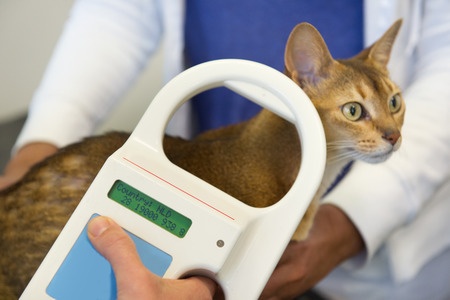 Few things are as heartbreaking as a lost pet, especially if it’s yours. As many as 8 million dogs and cats end up in animal shelters each year, and sadly, fewer than 20% are ever reunited with their owners. If those owners had taken one easy step, that outcome could have been avoided. A simple microchip can mean the difference between bringing your furry friend home, or having him or her adopted by another family, or worse, euthanized.
Few things are as heartbreaking as a lost pet, especially if it’s yours. As many as 8 million dogs and cats end up in animal shelters each year, and sadly, fewer than 20% are ever reunited with their owners. If those owners had taken one easy step, that outcome could have been avoided. A simple microchip can mean the difference between bringing your furry friend home, or having him or her adopted by another family, or worse, euthanized.
What Exactly Is a Microchip?
A pet microchip is a small computer chip, about the size of a grain of rice. It is implanted under the skin of an animal between the shoulder blades. The chip contains a unique identification number in the form of radio-frequency identification (RFID) tagging. When a special hand-held scanner (most vets and animal shelters have one) is passed over the microchip, it picks up a radio signal and returns the animal’s ID number. That number is called in to a pet registry and matched to the owner’s contact information. That means that a microchip is only effective if it has been registered. Too many people get their pets chipped and don’t know they have to register it. Powell Veterinary Service removes the burden of having to register your pet’s microchip. Your dog or cat’s chip is registered immediately after it is inserted—before you ever leave our office.
Does It Hurt?
A microchip is inserted under the skin using a needle and syringe, just as if he or she was getting a vaccination, and hurts about the same. Chances are, your pet won’t even notice. Although relatively painless, some prefer to chip their pets while they are anesthetized for a spay or neuter or a dental procedure. The chip is made from material that is compatible with living tissue so complications are rare.
What a Microchip Is Not
A microchip is not a tracker. It does not use GPS technology to tell you where your pet is. And you should still have your pet wear an ID tag or rabies tag on its collar. More animals are returned because of ID tags than microchips (because it’s readily viewable, without a microchip scanner). However, a collar can come off or be taken off by a thief or someone who intends to keep your dog, and cats should have a breakaway collar so it doesn’t get hung up on a fence or tree branch.
Remember, if your contact information changes or you must rehome your pet for some reason, you need to call the microchip registry company and update the information. Some registries will charge you for updates, but the microchip company Powell Veterinary Services uses does not. Give us a call and let us help keep your furry friends safe. The cost is only $42.50 and includes a lifetime registration. And remember, if you find a lost pet without tags, take it to your veterinarian or animal shelter to have it scanned for a microchip so you can return someone else’s furry friend.

WORKING HOURS:
Monday-Friday 8:00am - 5:00pm
Saturday 8:00am - 12:00 noon